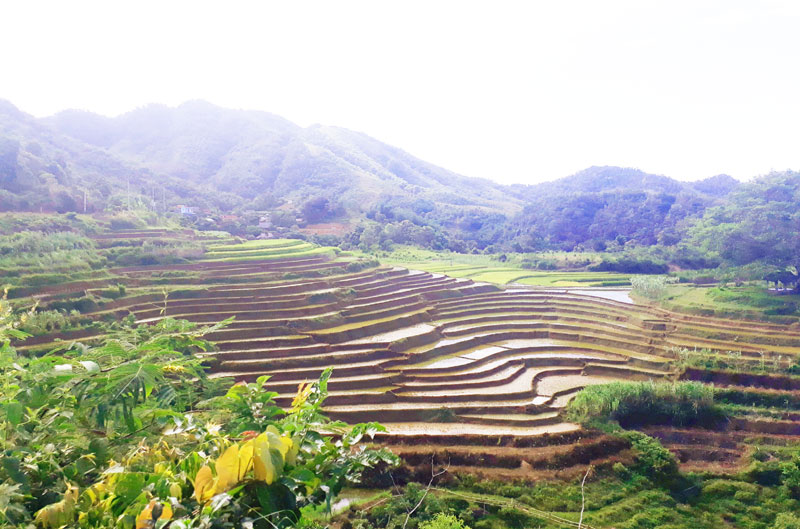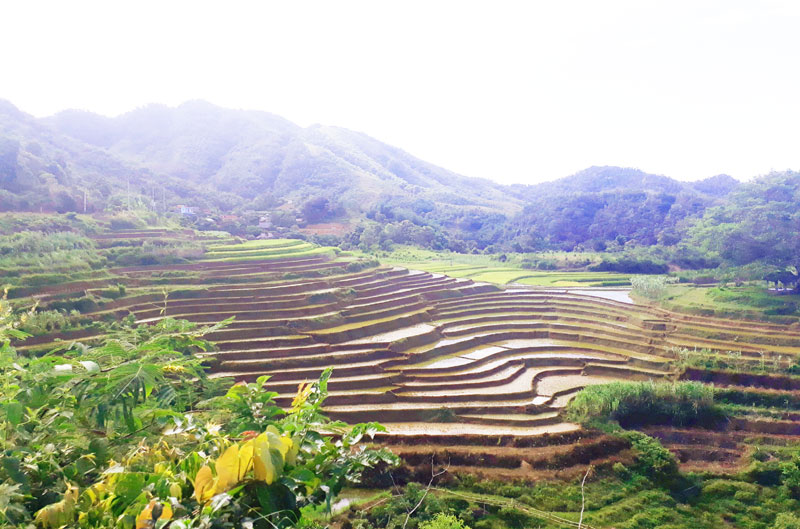
(HBO) - Mung village sits on the highest place in Xuan Phong commune, Cao Phong district with poetic landscape. Despite rough traffic and difficulties in the economy, Mung remains attractive to tourists thanks to its mild and fresh climate, and stilt houses on vast terraced fields.
Apart
from cool mild climate, the scenery of Mung village is dotted with terraced
The
winding fields and glimpses of roofs of stilt houses have made the land
enchanting. Below the foot of the terraced fields is a years-old banyan tree
spanning dozens of meters, which is considered a spiritual symbol of Muong
ethnic village.
The
climate in Mung is cool all year round thanks to its higher geographic location
than surrounding area. In particular, Mung is considered a green lung with
520ha of natural forest zoned off for protection. We visited the family of Ms.
Bui Thi Om, 73 and were invited to drink a cup of water boiled with medicinal
herbs picked in the forest. She said the forest brings cool mild climate,
bamboo shoots and firewood to local residents so that it must be protected for
later generations. "In the past, the road was enough for only a motorbike, but
now thanks to the Party and State support, local lives have improved a lot with
easier access to bigger roads and electricity”, she said.
Bui Van
Linh, chief of Mung village, said though lives have improved, local residents
still mainly live on bamboo shoots, corn, cassava and rice so that their income
remain low. Mung is still an especially difficult village with an annual
average income per capita of 12 million VND (2017), 6 million VND lower than
that in Xuan Phong commune. In order to sustainably reduce poverty, Linh and
locals have thought a lot to find a new direction, most recently travel idea.
"The
village has cool climate, lush green forests, beautiful terraced fields, and
intact traditional culture of Muong ethnic group. Many groups of tourists
visited the village and expressed their impression on local scenery and people
here so we found out that Mung holds potential of tourism development. In
April, departments, agencies, mass organizations and households in the village
(70 people) held tours of Moc Chau in Son La province and Lac village in Mai
Chau district to learn about their experience in community-based tourism.
Following such visits, we hope that authorities would offer support to us to
develop tourism in the future”, Linh said./.
A diverse chain of eco-tourism and resort destinations concentrated in Hoa Binh city and the districts of Tan Lac, Da Bac, and Luong Son… Along with the launch of several key high-quality resort tourism projects, these developments have reshaped the landscape and enhanced the appeal of Hoa Binh as a travel destination.
Boasting diverse terrain, a mild climate, and rich natural resources, Cao Phong district is increasingly asserting its place on Vietnam’s tourism map, attracting both domestic and foreign visitors. The district is renowned for its stunning landscapes, majestic mountains, a crystal-clear hydropower lake, and the unique cultural identity of local ethnic groups.
With its pristine landscapes, unique cultural heritage of Muong ethnic minority, and an expanding range of visitor experiences, Tan Lac district of Hoa Binh has fast become a captivating destination for both domestic and international tourists.
Until now, Sung village in Cao Son commune, Da Bac district remains the only Dao ethnic community in Hoa Binh province to develop a community-based tourism model. Beyond its untouched natural landscapes, cultural identity serves as the cornerstone attraction for visitors.
Alongside the diverse cultural identities of the Kinh, Muong, Tay, Thai, Dao, and Mong ethnic people, Hoa Binh province is also renowned as the "capital" of the northwestern Vietnamese cuisine, offering unique and distinctive dishes. At festivals, during Lunar New Year (Tet), or on significant family or community occasions, special dishes are prepared, leaving a lasting impression on visitors.
A Phong Linh (Yellow Tabebuia) flower garden in Thang village, Thach Yen commune, Cao Phong district is currently in full bloom, drawing a large number of visitors.



